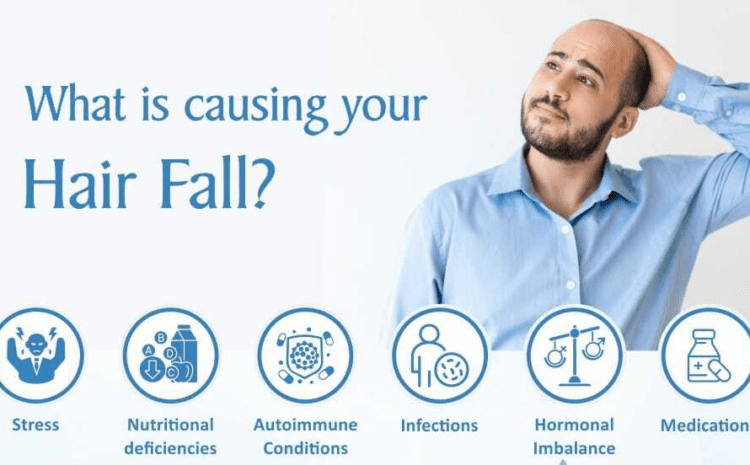Understanding The Causes of Hair Fall and Effective Hair Loss Treatments

TABLE OF CONTENTS
- Poor Nutrition
- Hormonal Imbalance
- Stress and Anxiety
- Scalp Infections
- Excessive Use of Hair Styling Products
- Genetics
- Medical Conditions and Medications
- Male Pattern Baldness
- Female Pattern Hair Loss
- Consultation with a Trichologis
- Blood Tests
- Scalp Biopsy
- Topical Treatments
- Oral Medications
- Platelet-Rich Plasma (PRP) Therapy
- Low-Level Laser Therapy (LLLT)
- Hair Transplantation
- Aloe Vera
- Coconut Oil
- Onion Juice
- Essential Oils
- Scalp Massage
- Lifestyle Changes for Healthy Hair
- Balanced Diet
- Regular Exercise
- Stress Management
- Proper Hair Care
B. Hormonal Imbalance – Hormones play a significant role in our body’s functioning, and when they fluctuate during different life stages, like puberty, pregnancy, or menopause, they can impact our hair growth cycle. Don’t be alarmed if you notice some shedding; it’s a natural part of the process. Understanding these changes can help you navigate through with a cool head and take proactive steps to maintain healthy hair. Keep it real and stay informed.
C. Stress and Anxiety – When life gets hectic and stress levels soar, it can mess with our hair growth cycle. The strain may lead to temporary hair shedding or worsen existing hair loss conditions. real and stay informed.
E. Excessive Use of Hair Styling Products – Overuse of styling products, such as gels and sprays, can damage hair and lead to hair fall.
F. Genetics – Family history plays a significant role in determining the likelihood of hair loss.
G. Medical Conditions and Medications – Certain medical conditions and medications can contribute to hair fall.
A. Consultation with a Trichologist – A trichologist can assess hair health and recommend suitable treatments.
D. Blood Tests – Blood tests help identify nutritional deficiencies and hormonal imbalances. www.healthsquad.in is a platform that offers you a wide range of options for blood tests from several well-known and reputable pathology labs, all at the best prices. We have partnered with multiple labs to give you the freedom to choose the one that suits your needs and budget. Thyrocare offers two great packages, one each for men and women, which include all the tests needed to figure out what’s causing hair fall. They help check various factors that might be affecting your hair health. With these packages, you can get a comprehensive understanding of your condition, and Thyrocare ensures you have all the necessary information to tackle the issue effectively. The packages are Men’s hair fall screening advanced(43 parameters) and Women’s hair fall screening advanced(47 parameters)
6. Hair Loss Treatments
A. Topical Treatments: Two common options are Minoxidil and finasteride, which you can apply directly to your scalp to encourage hair growth.
B. Oral Medications: For prescribed solutions like finasteride, they can slow down hair loss when taken orally.
C. Platelet-Rich Plasma (PRP) Therapy: This unique treatment uses your own blood to stimulate hair growth, promoting natural regrowth.
D. Low-Level Laser Therapy (LLLT): LLLT involves using red light to stimulate hair follicles, giving them a boost and encouraging hair growth.
E. Hair Transplantation: In this surgical option, healthy hair follicles are taken from one area and grafted onto balding spots, giving you a chance to regain a fuller head of hair.
